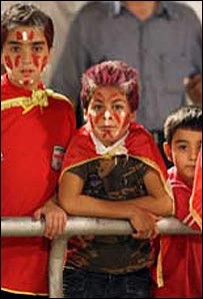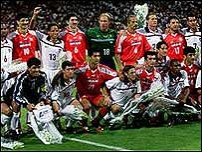|
BBC – It is still three hours till the big game at Tehran's Azadi stadium. But already 100,000 spectators are crammed in. The noise is deafening. The atmosphere has reached boiling point. In the centre of this cauldron is an Iranian-American who has taken on one of Iran's top coaching jobs - just as Iran and America are locked in a bitter confrontation. Afshin Qutbi is an Iranian-American who has spent most of his life outside Iran. Now he is coaching the top side in Tehran, Perspolis. And he has come back to a hero's welcome. "When I returned to this country, the reception I received on the streets, the love I feel from my countrymen, it's very heartfelt," he explained. Culture shock Like any coming home after so long away, it has been emotional, and it has been a culture shock. It is not just the bear-pit atmosphere at the stadium. There is also the Koranic recitation, and playing of the national anthem. And that is just before the press conference! Above all, Afshin Qutbi has returned to a country that is football crazy. "What I have witnessed is, the passion for football here is greater than anywhere I have been so far," he enthuses. "Partly because people love the game, partly maybe because people don't have as many options or entertainment that they have in the West." Wealth of experience He has come from a job coaching the South Korean national team.
Before that he worked in the Netherlands and at LA Galaxy (David Beckham's club in Los Angeles). He was even on the coaching staff of the US national side when they met Iran in a famous World Cup clash in 1998. On the training field in Tehran, he finds facilities perhaps not quite as state of the art as in LA, but more than compensated for by the enthusiasm of both fans and players. "Everywhere is different. We learn as coaches as we travel and work in different parts of the world that you adapt and become flexible," he says. "In America sometimes the passion of the game is missing. In Korea you had all the facilities but players who were very systematic. They didn't have the intuition and the creativity. "So those are things you have to deal with. If you want to be successful you learn to adapt." So how are the fans taking to this American-accented coach, a man more at home speaking in English than Farsi? Is there any suspicion of him at a time when the governments of Iran and the United States are not exactly best friends? It is all going very well, according to football commentator Hamed Momani. "Since he has been in Iran he has changed many things in the way he leads his team in the Iranian professional league," Hamed said. "The Iranian people, especially Iranian fans, like the way he behaves, especially in post-match press conferences." "There is less name-calling, less criticism of the referee, or of the other side, and more discussion of the finer points of the game," says Hamed Momani. Diplomatic answers As a person, Afshin Qutbi is hard to dislike. He is personable and well-presented, someone with a few moments to speak to everybody. And in these troubled times he is a diplomat as well. Ask him about politics and he politely deflects the question. "I have tried to stay away from that and I only concentrate on football. We can talk about the politics in football. But on the politics of governments that is neither my expertise nor my interest." So could football bring Iran and the United States together? "I think football can bring all people together. I always believed that love and football are the two things we share on this earth." And so far Afshin Qutbi has certainly been a good ambassador for football. He has taken his team, Perspolis, to the top of the Iranian league. And he is already being talked about as a possible Iranian national team coach. |
Hero status for Iran's US coach
- Persianleague
- - Nov 22, 2007
Latest News
- Iran Close to Finalizing Friendly Match Against Portugal Ahead of 2026 World Cup
- FIFA Announces Match Times and Venues for Iran’s 2026 World Cup Games
- Iran Needs Four Friendlies Ahead of 2026 World Cup: Ghalenoei
- Iran Drawn with Belgium, Egypt and New Zealand at the 2026 FIFA World Cup
- Ghalenoei to Attend World Cup 2026 Draw in Washington D.C.
- Iran miss out on 2025 Women’s Futsal World Cup quarterfinals [VIDEO]
- Iran Boycotts 2026 World Cup Draw After Visa Denials
- Iran 3–1 Palestine — Strong Comeback for U17 Team [VIDEO]
- ACL: Esteghlal 1–1 Al Wasl [VIDEO]
- Round of 16 Draw Set for Iran’s Hazfi Cup


